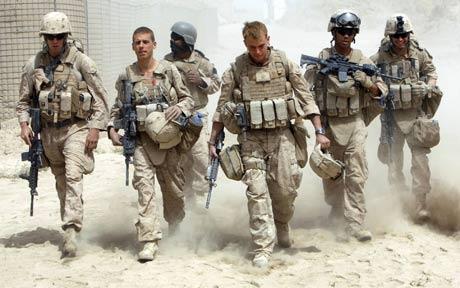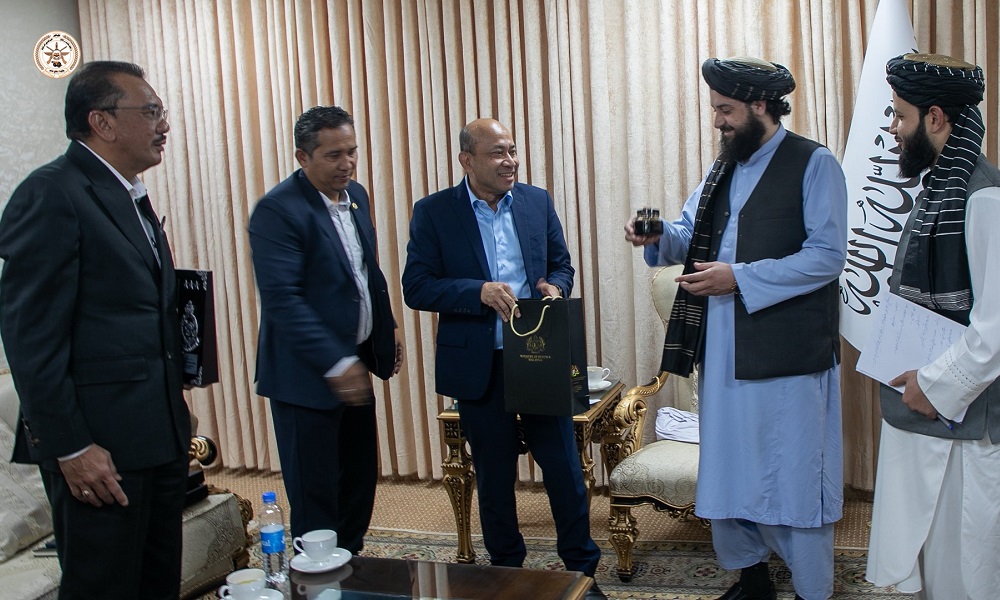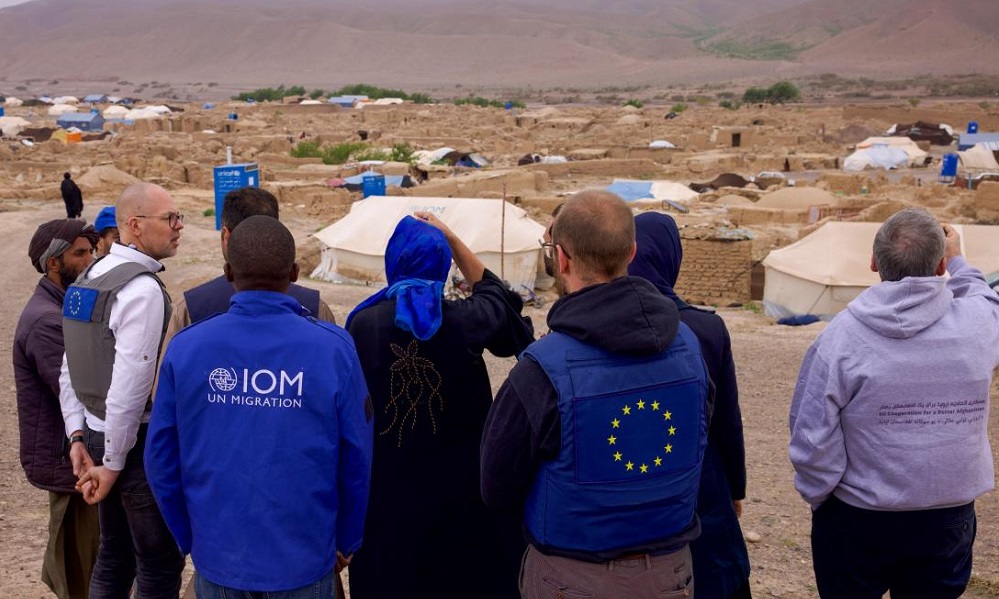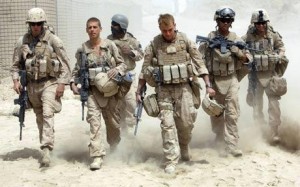Latest News
US troops might stay for decades in Afghanistan

Top U.S. military commanders, who only a few months ago were planning to pull the last American troops out of Afghanistan by year’s end, are now quietly talking about an American commitment that could keep thousands of troops in the country for decades.
The shift in mind-set, made possible by President Obama’s decision last fall to cancel withdrawal plans, reflects the Afghan government’s vulnerability to continued militant assault and concern that terrorist groups such as al-Qaeda continue to build training camps whose effect could be felt far beyond the region, said senior military officials.
The new American outlook marks a striking change for Obama, who campaigned on a promise to bring American troops home and has said repeatedly that he does not support the “idea of endless war.”
And it highlights a major shift for the American military, which has spent much of the past decade racing to hit milestones as part of its broader “exit strategy” from Afghanistan and Iraq.
These days, that phrase has largely disappeared from the military’s lexicon.
In its place, there is a broad recognition in the Pentagon that building an effective Afghan army and police force will take a generation’s commitment, including billions of dollars a year in outside funding and constant support from thousands of foreign advisers on the ground.
“What we’ve learned is that you can’t really leave,” said a senior Pentagon official with extensive experience in Afghanistan and Iraq who like others spoke on the condition of anonymity to describe internal discussions.
“The local forces need air support, intelligence and help with logistics. They are not going to be ready in three years or five years. You have to be there for a very long time.”
Senior U.S. commanders have also been surprised by al-Qaeda’s resilience and ability to find a haven in the Afghan countryside, as well as the Taliban’s repeated seizure of large tracts of contested territory.
In November, the U.S. military sent a company of elite U.S. Rangers to southeastern Afghanistan to help Afghan counterterrorism forces destroy an al-Qaeda training camp in a “fierce fight” that lasted for several days.
The training camp was “absolutely massive,” said Brig. Gen. Wilson Shoffner, a military spokesman in Afghanistan.
“No matter what happens in the next couple of years Afghanistan is going to have wide ungoverned spaces that violent extremist organizations can take advantage of,” Shoffner said. “The camp that developed in southeastern Kandahar is an example of what can happen.”
There are now 9,800 U.S. troops in Afghanistan, some of them advising local forces and some focused on hunting down al-Qaeda and other hard-line militants.
Plans call for Obama to halve that force by the time he leaves office, but he could defer the decision to the next president.
The U.S. military’s current thinking reflects its painful experience in Iraq, where Iraqi army forces collapsed less than three years after American forces left in 2011.
And it’s echoed in the arguments made by many Republican and Democratic foreign policy advisers, looking beyond the Obama presidency, for a significant long-term American presence.
“This is not a region you want to abandon,” said Michèle Flournoy, a former Pentagon official who would probably be considered a top candidate for defense secretary in a Hillary Clinton administration. “So the question is what do we need going forward given our interests?”
In Helmand province, where American troops suffered the heaviest losses of the war, Afghan units have struggled to hold on to territory taken by American forces from the Taliban in 2011 and 2012.
“There’s a real will-to-fight issue there,” said a senior military official in Kabul.
Senior American commanders said that the Afghan troops in the province have lacked effective leaders as well as the necessary weapons and ammunition to hold off persistent Taliban attacks.
Some Afghan soldiers in Helmand have been fighting in tough conditions for years without a break to see family, leading to poor morale and high desertion rates.
Gen. John F. Campbell, the top American commander, has sent Special Operations forces to the province to help direct American airstrikes and provide help with planning.
An American soldier was killed and two others were wounded this month fighting alongside the Afghans.
In addition, about 300 U.S. troops in Helmand are advising Afghan commanders at the corps level, well removed from the front lines.
The American support is designed to arrest the immediate losses, but building an effective and sustainable fighting force that can manage contested areas such as Helmand province, will take many years, U.S. military officials said.
Foreign officials say the Afghan units lack effective mid-level officers and sergeants who can lead troops in combat and are not captive to patronage networks that dominate the country and sap soldier morale.
Seeding the force with mid-level officers often requires bringing in young leaders from outside the current system and training them from scratch.
“I think a generational approach has value,” Shoffner said.
Senior U.S. officials point to improvements in areas such as evacuating wounded troops from the battlefield.
As recently as 2013, it took the Afghan army 24 hours on average to get medical assistance to wounded troops.
Now help usually arrives in four hours, still longer than desired. But other critical goals, such as building an effective resupply system for the country or a capable air force, cannot be accomplished in a few years.
Many of the American pilots flying in Afghanistan have 10 to 15 years of experience.
“How long does it take to grow a 15-year pilot? It takes about 15 years,” Shoffner said. “We’re starting a little late with the air force.”
Senior U.S. military officials and some former Obama administration officials increasingly compare the U.S. government’s plans for Afghanistan to its approach to South Korea, where it has maintained tens of thousands of troops for decades.
Other top officials cite the example of Colombia, where the United States has long provided training, money and contractors.
“Our presence right now helps serve as a significant bulwark against instability and at a cost that I think is reasonable to bear,” said Daniel Feldman, who until recently served as the Obama administration’s special representative for Afghanistan and Pakistan.
“Particularly if we’re not proposing a significant combat role, I think the American people would be open to the argument of sticking with Afghanistan.”
U.S. officials said that in Afghan President Ashraf Ghani they have a willing and reliable partner who can provide bases to attack terrorist groups, not just in Afghanistan but also throughout South Asia, for as long as the threat in the chronically unstable region persists.
The difference between Afghanistan and other long-term American commitments in South Korea and Colombia is that Afghanistan remains a far more dangerous and unstable place for American personnel.
Even though Afghan troops have assumed the lead combat role throughout the country, with U.S. troops in an advisory role, Americans still face real dangers and have taken recent casualties there.
In some cases, senior U.S. officials have been surprised by the Taliban comeback in the past year.
Emboldened by the departure of most foreign forces, Taliban fighters have seized district centers, inflicted heavy losses on government forces and temporarily overrun a provincial capital.
Now, Afghan forces must also grapple with an aggressive local branch of the Islamic State.
Some officials hold out hope that a long-term military presence might be unnecessary, if hoped-for peace talks with the Taliban make progress.
The Afghan government has asked Pakistan, home to many Taliban leaders, to push the militants into talks.
A generational U.S. footprint “doesn’t need to be the case,” said Jeff Eggers, a former senior White House official with long experience working on Afghanistan and Pakistan. “The Korea model is not necessary if the peace process moves forward — that’s the preferred path for all parties.”
The obstacles to peace talks, though, are huge. Senior officials in Kabul and Islamabad, Pakistan, are riven by suspicion, and the Taliban remains deeply fractured following the revelation that its longtime leader, Mohammad Omar, has been dead for more than two years.
Washington Post

Latest News
Tripartite trade meeting held in Kabul to boost regional connectivity

A tripartite meeting between the delegations of Afghanistan, Turkmenistan and Kazakhstan was held in Kabul with the aim of connecting North Asia to South Asia and reducing transit and transportation costs among these three countries, the Ministry of Trade and Commerce said in a statement.
In this meeting, an agreement was reached on the creation of a joint technical committee to continue the talks.
This tripartite meeting was held under the leadership of Nooruddin Azizi, the Acting Minister of Industry and Commerce, Vice President of Turkmenistan and Srik Zhumangarin, the Deputy Prime Minister of Kazakhstan.
Earlier, a bilateral meeting was held between the delegation of the Islamic Emirate and Turkmenistan. The ministry of commerce said the participants of the meeting discussed the construction of a large joint logistics center in Torghondi, the trilateral transit agreement between the IEA, Turkmenistan, and Kazakhstan, the expansion of Afghanistan’s railway, solving issues related to Afghan transit and export goods, and a number of other commercial issues.
Latest News
No destructive groups including Daesh present in Afghanistan: Yaqub Mujahid

Acting Minister of National Defense Mohammad Yaqub Mujahid has said that no destructive groups including Daesh have physical presence in Afghanistan, adding the Islamic Emirate of Afghanistan (IEA) will not allow anyone to pose threat to any country in the region from the Afghan soil.
Mujahid made the remarks in a meeting with a delegation from Malaysia in Kabul on Thursday.
According to a statement released by the Ministry of Defense, Mujahid highlighted Malaysia’s “good treatment” of Afghan refugees and its long-standing relations with Afghanistan, and said that Malaysia is a powerful Islamic country and visits should increase.
He added that with the establishment of the Islamic Emirate, occupation and war ended in Afghanistan, and the country is fully secure.
Based on the statement, the Malaysian delegation called Afghanistan a friendly country and while emphasizing on comprehensive cooperation, it assured that what they have seen in Afghanistan will be shared with the authorities of their country.
Latest News
EU allocates 17 million euros to support Afghans on the move

The European Union signed an agreement worth 17 million euros with the International Organization for Migration (IOM) to improve access to basic services, increased economic opportunities and protection for Afghans on the move and their host communities in Afghanistan.
The needs of women and girls are a particular focus of the programme, EU said in a statement released on Thursday.
The statement noted that from January 2023 until April 2024, over 1.5 million Afghans returned from Pakistan and Iran.
“I am deeply moved by the hardship returnees face when being deported to Afghanistan. In a country suffering from poverty and climate change, and in a city that just saw devastating earthquakes, this truly is a crisis within a crisis.”, said Peteris Ustubs, Director for the Middle East, Asia and Pacific of the European Commission’s Department for International Partnerships during the signing ceremony at the IOM transit centre in Herat.
Raffaella Iodice, EU Chargée d’Affaires a.i. to Afghanistan, added “The solidarity of the Afghan people towards their brothers and sisters is an inspiration. We must assure that communities hosting and helping new arrivals are supported. The partnership with IOM ensures access to essential services and provides protection for Afghan returnees and their host communities. As women and girls can be particularly affected, we make sure that all members of society can benefit”.
“IOM’s continued partnership with the EU has been critical in enabling our teams to reach hundreds of thousands of Afghan returnees and other vulnerable communities in the country”, said IOM Afghanistan Chief of Mission, Maria Moita. “Thanks to this renewed commitment, we will be able to focus on addressing the immense challenges in the areas of return and contribute to reintegration, social cohesion, and longer-term solutions for those communities.”
This additional contribution is part of a 5-year programme that is being implemented across Afghanistan and in four countries in the region. It builds on the EU’s previous support to IOM to improve the wellbeing of Afghans forced to return to the country, EU said.
-

 Latest News3 days ago
Latest News3 days agoRashid Khan named AWCC’s brand ambassador
-

 Regional4 days ago
Regional4 days agoIranian president lands in Pakistan for three-day visit to mend ties
-

 Sport4 days ago
Sport4 days agoKolkata beat Bengaluru by one run in IPL as Kohli fumes at dismissal
-

 Sport5 days ago
Sport5 days agoACL: Aino Mina 3-0 Istiqlal Kabul; Attack Energy 3-0 Khadim
-

 Climate Change5 days ago
Climate Change5 days agoRescuers race to reach those trapped by floods in China’s Guangdong
-

 World4 days ago
World4 days agoMalaysian navy helicopters collide in mid-air, 10 killed
-

 Sport3 days ago
Sport3 days agoJaiswal ton powers Rajasthan to big IPL win
-

 World3 days ago
World3 days agoNorth Korea officials visit Iran in a rare public trip
















